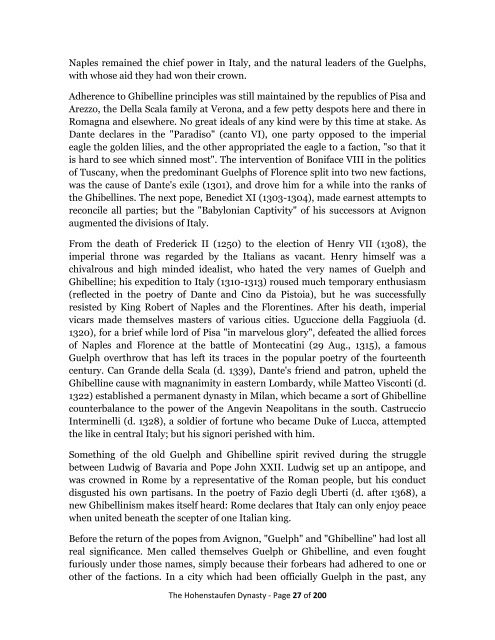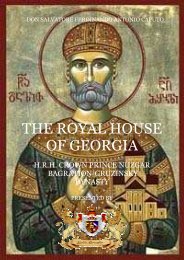here - Nobility Associations
here - Nobility Associations
here - Nobility Associations
Create successful ePaper yourself
Turn your PDF publications into a flip-book with our unique Google optimized e-Paper software.
Naples remained the chief power in Italy, and the natural leaders of the Guelphs,<br />
with whose aid they had won their crown.<br />
Ad<strong>here</strong>nce to Ghibelline principles was still maintained by the republics of Pisa and<br />
Arezzo, the Della Scala family at Verona, and a few petty despots <strong>here</strong> and t<strong>here</strong> in<br />
Romagna and elsew<strong>here</strong>. No great ideals of any kind were by this time at stake. As<br />
Dante declares in the "Paradiso" (canto VI), one party opposed to the imperial<br />
eagle the golden lilies, and the other appropriated the eagle to a faction, "so that it<br />
is hard to see which sinned most". The intervention of Boniface VIII in the politics<br />
of Tuscany, when the predominant Guelphs of Florence split into two new factions,<br />
was the cause of Dante's exile (1301), and drove him for a while into the ranks of<br />
the Ghibellines. The next pope, Benedict XI (1303-1304), made earnest attempts to<br />
reconcile all parties; but the "Babylonian Captivity" of his successors at Avignon<br />
augmented the divisions of Italy.<br />
From the death of Frederick II (1250) to the election of Henry VII (1308), the<br />
imperial throne was regarded by the Italians as vacant. Henry himself was a<br />
chivalrous and high minded idealist, who hated the very names of Guelph and<br />
Ghibelline; his expedition to Italy (1310-1313) roused much temporary enthusiasm<br />
(reflected in the poetry of Dante and Cino da Pistoia), but he was successfully<br />
resisted by King Robert of Naples and the Florentines. After his death, imperial<br />
vicars made themselves masters of various cities. Uguccione della Faggiuola (d.<br />
1320), for a brief while lord of Pisa "in marvelous glory", defeated the allied forces<br />
of Naples and Florence at the battle of Montecatini (29 Aug., 1315), a famous<br />
Guelph overthrow that has left its traces in the popular poetry of the fourteenth<br />
century. Can Grande della Scala (d. 1339), Dante's friend and patron, upheld the<br />
Ghibelline cause with magnanimity in eastern Lombardy, while Matteo Visconti (d.<br />
1322) established a permanent dynasty in Milan, which became a sort of Ghibelline<br />
counterbalance to the power of the Angevin Neapolitans in the south. Castruccio<br />
Interminelli (d. 1328), a soldier of fortune who became Duke of Lucca, attempted<br />
the like in central Italy; but his signori perished with him.<br />
Something of the old Guelph and Ghibelline spirit revived during the struggle<br />
between Ludwig of Bavaria and Pope John XXII. Ludwig set up an antipope, and<br />
was crowned in Rome by a representative of the Roman people, but his conduct<br />
disgusted his own partisans. In the poetry of Fazio degli Uberti (d. after 1368), a<br />
new Ghibellinism makes itself heard: Rome declares that Italy can only enjoy peace<br />
when united beneath the scepter of one Italian king.<br />
Before the return of the popes from Avignon, "Guelph" and "Ghibelline" had lost all<br />
real significance. Men called themselves Guelph or Ghibelline, and even fought<br />
furiously under those names, simply because their forbears had ad<strong>here</strong>d to one or<br />
other of the factions. In a city which had been officially Guelph in the past, any<br />
The Hohenstaufen Dynasty - Page 27 of 200



